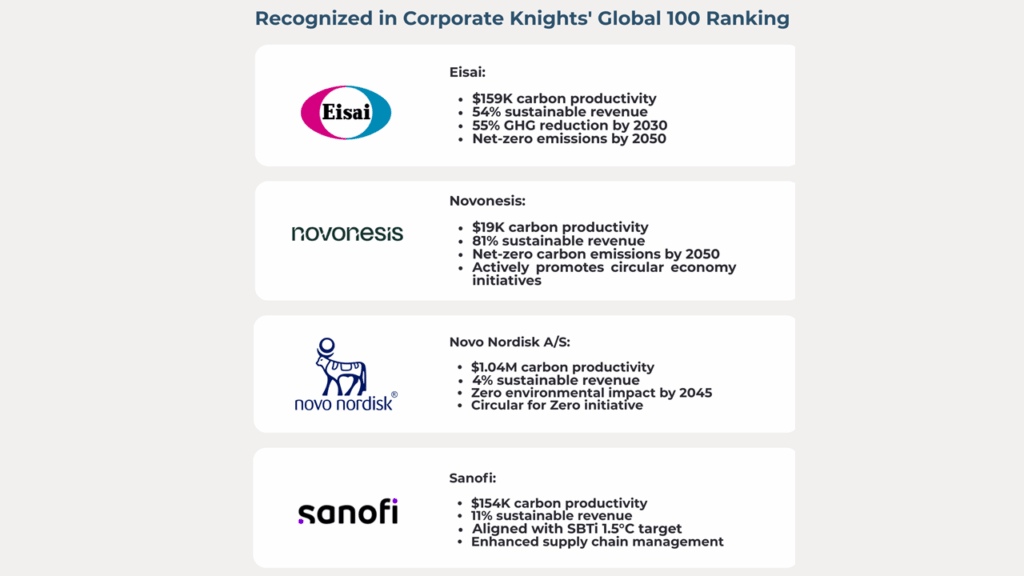Every year, Corporate Knights publishes its Global 100 ranking of the world’s most sustainable companies. This list identifies organizations leading the way in the green transition.
As climate change, resource depletion and health inequities rock the world, sustainability has become a key focus. More pharma and biotech companies are embracing environmental, social and governance (ESG) practices to reduce emissions, adopt circular economies and improve access to medicine — redefining responsible healthcare.
The Corporate Knights Global 100 list assesses companies on a range of metrics, including carbon productivity, gender diversity on boards, sustainable revenue and climate commitments.
Among the 2025 honorees are four pharmaceutical and biotech companies: Eisai Co Ltd, Novonesis A/S, Novo Nordisk A/S and Sanofi SA. Novo Nordisk and Sanofi were also recognized in Time’s 2024 list of the World’s Most Sustainable Companies. Let’s explore why these companies earned their spots and how they are driving sustainable healthcare innovation.
Related: Top 10 Most Environmentally Sustainable Pharma Companies in 2023/2024
Eisai Co Ltd: Patient-Centric and Environmentally Mindful
Ranked 35th and listed nine times by Corporate Knights, Eisai Co Ltd, headquartered in Tokyo, Japan, stands out for its balanced commitment to patient health and sustainability. The company’s carbon productivity reached $159,088, reflecting efficient economic output relative to its carbon emissions.
Eisai’s board has 18% gender diversity and sustainable revenue accounting for 54% of its total income.
Eisai’s initiatives include achieving carbon neutrality across its operations in Japan through renewable energy. On February 21, 2024, the company announced ambitious targets to reduce Scope 1 and 2 greenhouse gas emissions by 55% by fiscal 2030, based on a fiscal 2019 baseline, and achieve net-zero emissions by 2050.
In addition to its environmental initiatives, Eisai has distributed over 2.8 billion DEC tablets free of charge since 2013 as part of its efforts to eliminate lymphatic filariasis (LF) in endemic regions, aligned with the company’s goal to achieve LF elimination by 2030.
Eisai also plans to expand sustainable practices globally, focusing on green building designs and supply chain decarbonization.
As part of its commitment to the Science-Based Targets initiative (SBTi), a global program that guides companies in setting goals to reduce emissions and fight climate change, Eisai aligns its goals with limiting global warming to 1.5 degrees.
Novonesis A/S: Transforming Biotechnology for Sustainability
Novonesis A/S, ranked 49th by Corporate Knights, was initially known as Novozymes. Following its merger with Chr. Hansen, the company rebranded to Novonesis and is headquartered in Bagsvaerd, Denmark. Under CEO Ester Baiget, recently named among TIME100 Climate Leaders, Novonesis continues to lead in sustainability-focused biotech solutions.
The company’s carbon productivity of $19,805 demonstrates its deep investment in enzyme-based solutions that reduce environmental impact. With a board that is 30% gender-diverse, Novonesis also boasts sustainable revenue and investment at 81% and 53%, respectively.
The company develops biological alternatives to chemicals, including enzymes for biofuels and agricultural applications. In November 2024, Novonesis launched Eversa Advance, an enzymatic biosolution that enables biodiesel producers to process waste-based feedstocks more efficiently, reducing pre-treatment operating costs by up to 45% and lowering environmental impact.
Novonesis aims for net-zero carbon emissions by 2050 and actively promotes circular economy initiatives.
Novo Nordisk A/S: Innovating for Health and the Planet
Novo Nordisk A/S, also based in Bagsvaerd, Denmark, ranks 62nd by Corporate Knights, with an impressive carbon productivity of $1,035,533, the highest among its peers. The company’s board has 50% gender diversity, underscoring its progressive corporate structure.
Though the company’s sustainable revenue accounts for just 4%, Novo Nordisk actively invests in broader environmental initiatives.
Last year, it partnered with the Wellcome Trust to grant approximately $81.5 million (DKK 585 million) to the Ancient Environmental Genomics Initiative for Sustainability (AEGIS), advancing climate-resilient crops and showcasing its broader commitment to global sustainability. In October 2024, Novo Nordisk announced an investment of 864 million Brazilian reais (approximately $158 million) to modernize its insulin production plant in Montes Claros, Brazil, incorporating sustainable projects into the facility.
Novo Nordisk’s Circular for Zero initiative aims to eliminate waste across product lifecycles, including eco-friendly insulin delivery systems.
The company’s facilities operate on renewable energy, supporting its SBTi-aligned goal of achieving zero environmental impact by 2045.
Sanofi SA: Global Health Meets Sustainability
Ranked 91st by Corporate Knights, Sanofi SA, headquartered in Paris, France, reported carbon productivity of $154,001 and a board with 38% gender diversity. Despite sustainable revenue and investment figures of 11% and 1%, respectively, Sanofi’s strong climate commitments align with SBTi and the 1.5 degrees C target.
Sanofi’s 2024 sustainability achievements included strengthening health systems in low- and middle-income countries through its Global Health Unit. The IMPACT brand has become a cornerstone of its efforts, offering affordable, high-quality medications to patients with noncommunicable diseases in over 40 countries.
Partnerships, such as the MediFIKIA Project in Tanzania, were reported to enhance supply chain management by introducing digital tools like patient-held medical records.
Sanofi has also invested in training over 12,000 healthcare providers to improve care delivery and has a target of treating 2 million patients with noncommunicable diseases by 2030.
A Green Pharma and Biotech Future
Sustainability in healthcare is essential for innovation and global impact. Companies like Eisai, Novonesis, Novo Nordisk and Sanofi are not the only ones driving change.
Industry leaders like GSK and AstraZeneca are also spearheading green initiatives, including eco-friendly inhaler designs to reduce greenhouse gas emissions. AstraZeneca, as part of its Ambition Zero Carbon program, is transitioning its inhalers to low-carbon propellants, aiming to reduce the carbon footprint of its inhaler portfolio by 90% by 2030.
Together, they signal a collective push toward a greener, healthier future.












Join or login to leave a comment
JOIN LOGIN